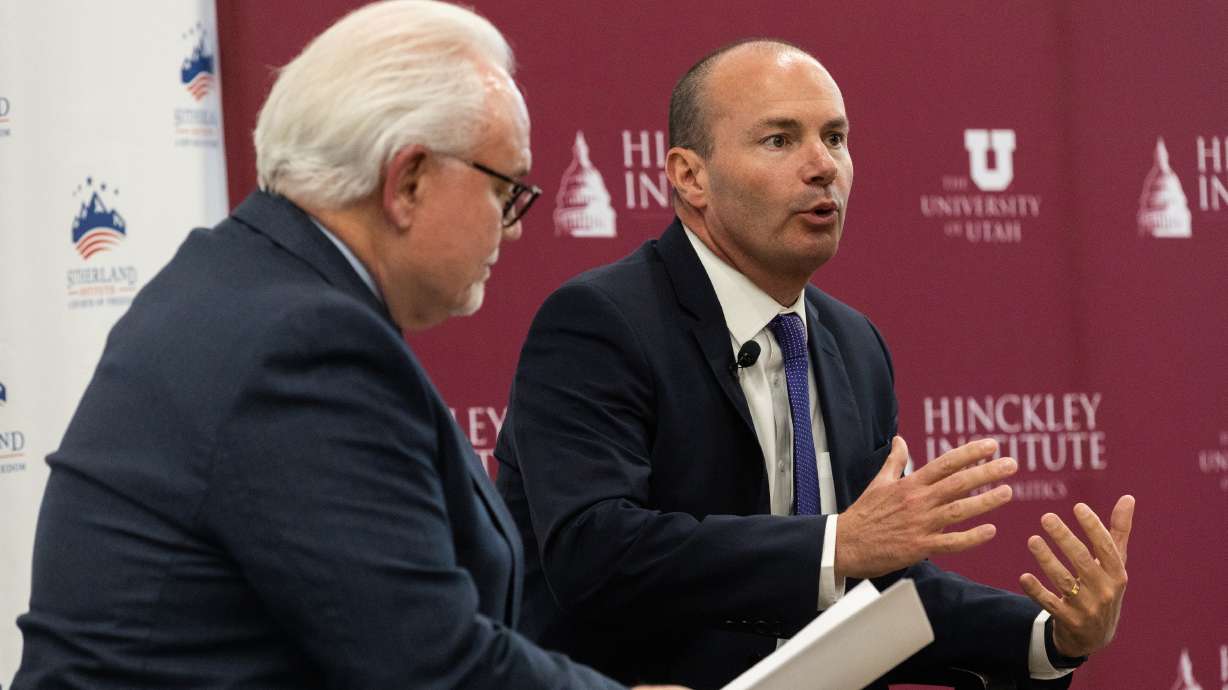Estimated read time: 3-4 minutes
This archived news story is available only for your personal, non-commercial use. Information in the story may be outdated or superseded by additional information. Reading or replaying the story in its archived form does not constitute a republication of the story.
SALT LAKE CITY — Congress continues to delegate too much power to federal agencies, according to Sen. Mike Lee, R-Utah, who said lawmakers need to claw back their constitutionally granted powers to legislate during a public appearance in Salt Lake City on Tuesday.
The subject is a familiar one for the senior senator, who is known for carrying a copy of the U.S. Constitution around with him. Although his pocket Constitution didn't make an appearance, Lee referenced the founding document often while arguing against regulations enacted by various agencies during a discussion at the Hinckley Institute of Politics as part of the Sutherland Institute's speaker series highlighting each member of Utah's congressional delegation.
"The founding fathers put together our system of government. They made Congress the most dangerous branch," he said. "(They) knew that the power to make law is inherently dangerous, and therefore made Congress the branch of government most accountable to the people at the most regular intervals. ... This is because the power to make law can be used abusively, they always wanted to make sure it was close to the people."
But Lee argued that dating back to the New Deal in the 1930s, lawmakers have increasingly delegated their power to executive branch agencies and departments to set regulations, cutting voters out of the process.
That's why he said he supports HR277, or the Regulations from the Executive in Need of Scrutiny (REINS) Act, which would require congressional approval before a new major rule or regulation could go into effect. Versions of the proposal have been floated around for years, but not enacted.
In May, Lee spoke out against the bipartisan debt ceiling deal agreed to by President Joe Biden and House Speaker Kevin McCarthy, R-Calif., because it struck the REINS Act from an earlier version.
While he doesn't doubt the intentions of bureaucrats who craft the regulations, he said they are not accountable to voters in the same way elected officials are, and they lack input from constituents and other stakeholders. He said he doesn't "want to send the impression that I'm referring to them derisively, because these are by and large people who are well-intentioned, hardworking, highly specialized in their fields, and are doing the best job that they can."
"I don't like to blame them," he continued. "I strongly dislike the policies they come up with, but they're not actually the problem. We are. Congress is the problem because we gave them this unbridled authority."
Although the REINS Act isn't a perfect solution to Lee, he said it will bring more balance to the nation's system of checks and balances. And while he acknowledged that it would bring more political disagreement around certain regulations, that's how the system is supposed to work.
"So yeah, it will inject politics into this. Some of this will be controversial. That is the whole point. The Constitution itself is an apolitical document. A democratic system of government, founded on a constitutional republic — like ours — cannot operate without a political system," he said.










